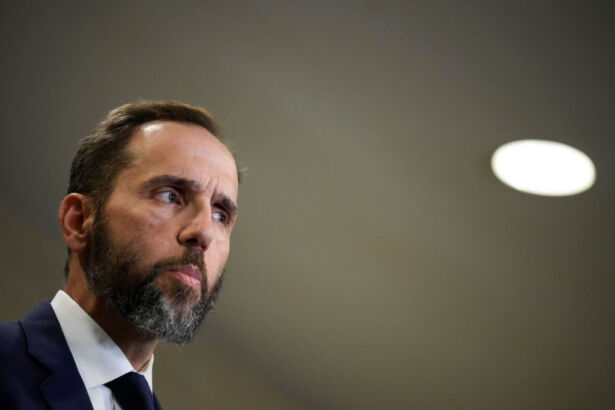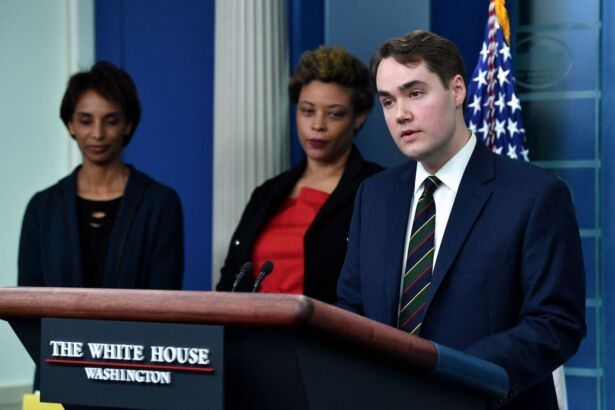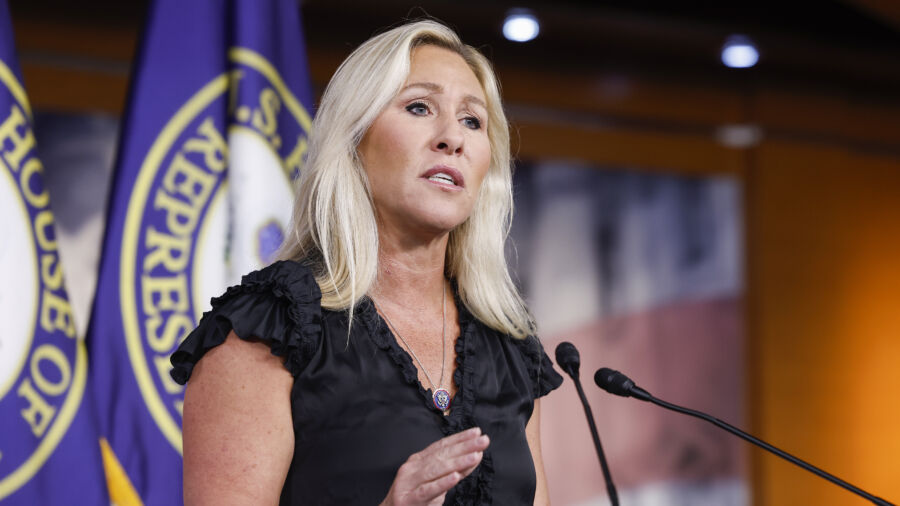Rep. Marjorie Taylor Greene (R-Ga.) has declared she won’t vote to fund the government without a House vote on whether or not to start an impeachment inquiry against President Joe Biden.
At a town hall-style meeting with her constituents on Thursday, Ms. Greene said a vote to initiate impeachment procedures against the president is one of four demands she will impose before she agrees to support the 2024 government budget.
“I’ve already decided I will not vote to fund the government unless we have passed an impeachment inquiry on Joe Biden,” she said.
Her impeachment demand comes as Republicans have been investigating whether President Biden’s family members enriched themselves by peddling access to the White House and whether President Biden knew of this behavior throughout his career in government.

Last week, House Speaker Kevin McCarthy (R-Calif.) said the Republican-controlled House could potentially move forward with an impeachment inquiry once they returned from their summer recess, but he suggested such a move might only come if the Biden administration fights to block Republican investigators.
Ms. Greene’s impeachment demands suggest she wants a firm answer on impeachment sooner rather than later.
In addition to demanding the impeachment inquiry, the Georgia Republican said she also wouldn’t support passing the government budget that does not also defund Special Counsel Jack Smith, who has brought two separate criminal indictments against former President Donald Trump.

She said she wants the House to strip Mr. Smith’s funding and to also fire U.S. Attorney David Weiss.
Mr. Weiss has been tasked to lead a special counsel investigation of President Biden’s son, Hunter Biden, but Ms. Greene and other Republicans have raised allegations that the federal prosecutor has largely shielded the president’s son from serious legal consequences.
“There should be no funding for Jack Smith’s special counsel. We have to fire David Weiss, who is protecting Hunter Biden on his special counsel, and we have to rein in the FBI,” Ms. Greene told her constituents. “I will not vote for money to go towards those things.”
Ms. Greene said her other conditions for supporting the government budget include defunding any new mask and vaccine mandates for COVID-19 and blocking new U.S. funding for the ongoing war in Ukraine, calling such wartime funding a “red line” and instead said, “we have to have peace.”
“I will be happy to work with all of my colleagues. I will work with the Speaker of the House. I will work with everyone. But I will not fund those things, and I thought it was most important for me to tell you all first because I work for you, and that’s what we have to do,” she told her audience.
Demands Risk Government Shutdown: White House
The White House hit back at Ms. Greene on Friday, saying her budget conditions risk forcing a government shutdown that will hurt the economy and undermine national security.
“The last thing the American people deserve is for extreme House members to trigger a government shutdown that hurts our economy, undermines our disaster preparedness, and forces our troops to work without guaranteed pay,” White House spokesperson Andrew Bates said in a Thursday press statement.
“The House Republicans responsible for keeping the government open already made a promise to the American public about government funding, and it would be a shame for them to break their word and fail the country because they caved to the hardcore fringe of their party in prioritizing a baseless impeachment stunt over high stakes needs Americans care about deeply – like fighting fentanyl trafficking, protecting our national security, and funding FEMA,” Mr. Bates added.

Budget negotiations could prove challenging as Congress is divided between the Republican-controlled House and the Democrat-controlled Senate. While Republicans control the House, there may also be some contentions between more conservative wings of the party, like the House Freedom Caucus, and moderate Republicans.
The House Freedom Caucus has indicated it’s willing to force a government shutdown unless lawmakers can agree to cap discretionary spending at $1.47 trillion for the year.
Time is running short for Congress and the White House to reach a budget agreement, and both the House and Senate have yet to return for negotiations. The Senate won’t return to work until next week, and the House won’t resume its work until the following week, leaving only a few days before the fiscal year ends on Sept. 30.
The White House Office of Management and Budget has begun urging Congress to prepare a short-term continuing resolution (CR) to partially fund the government until Congress can reach an agreement on a longer-term deal.
The House Freedom Caucus has set its own demands for a CR, stating it won’t accept a so-called “clean” CR because it would simply continue the same spending levels set in a $1.7 trillion omnibus spending bill that they vehemently opposed.
The Republican hardliners said they will instead demand that any CR should include the Secure the Border Act of 2023, along with measures to reverse “the unprecedented weaponization of the Justice Department and FBI” and “end the Left’s cancerous woke policies in the Pentagon undermining our military’s core warfighting mission.”

